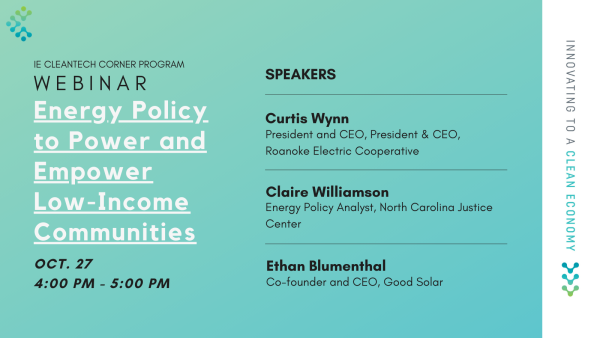Energy Policy to Power and Empower Low-Income Communities
December 30, 2020
Clean energy leaders Curtis Wynn, Ethan Blumenthal, and Claire Williamson made up the featured panel for the “Energy Policy to Power and Empower Low-Income Communities” webinar. They discussed the future of energy policy and efforts to increase equity with regard to access to clean and efficient energy. Wynn is the president and CEO of the Roanoke Electric Cooperative, which distributes power to 14,500 member accounts in northeastern North Carolina. Blumenthal is the CEO and co-founder of Good Solar, a nonprofit organization that creates energy solutions for nonprofit organizations and low- and moderate-income communities to promote social justice, combat climate change, provide community economic development and build community resilience. Williamson is the Energy Policy Advocate at the North Carolina Justice Center, where she advocates for safe and affordable energy for low-income North Carolinians.
During this webinar, the panelists:
Explained the environmental injustice issues they encounter in their fields, mentioning problems arising from a lack of energy efficiency. Williamson pointed out that energy efficiency not only addresses equity problems caused by high energy bills where homes are not energy efficient but also combats environmental issues by decreasing demand for energy. Williamson also emphasized how the COVID-19 pandemic has exacerbated these issues, explaining the need for people to have electricity and running water when being at home is so critical. She mentioned how the end of the moratorium on shutoffs has been a challenge for those struggling to pay energy bills during the pandemic. Similarly, Wynn discussed how the pandemic has affected the members of the Roanoke Electric Cooperative and the importance of affordable energy. Blumenthal added that high prices for renewable energy have widened the gap between high- and low-income communities, noting that low-income and high-minority areas are often disproportionately impacted by pollution.
Explored a variety of energy policy solutions and technologies for addressing energy efficiency problems and consequential inequalities. Wynn provided an overview of the Community Solar program at the Roanoke Electric Cooperative, which combines energy efficiency and solar development to create an opportunity for members to purchase solar energy output. Williamson mentioned the NC Justice Center’s efforts to create a simpler, uniform application for urgent repair, energy efficiency, and weatherization programs. This uniformity decreases the burden on residents to access the programs that are available to them. The panelists discussed the need for energy policy to ensure the most vulnerable populations do not bear the financial burden of the transition to a cleaner grid, specifically highlighting heat pump water heaters as a useful technology for energy storage and efficiency.
Discussed the importance of community engagement in their work. Wynn mentioned the importance of informing members about time-of-use rates that can drastically impact the cost of energy as well as smart devices that can help lower energy bills. He also mentioned the potential for bidirectional chargers to create battery storage and offset the costs of environmentally-friendly electric vehicles. Blumenthal described the role of cities in electrification, similarly pointing out the potential for electric school buses to provide storage and increase grid resiliency.
To help answer a few follow-up questions from attendees, we reached out to Curtis Wynn to learn his perspective on the following topics.
Q: What are some practices for making community solar accessible to low-income communities?
A: Selling the value of the output at the avoided cost of producing solar power is the primary way this is done. The avoided cost is the incremental cost to an electric utility of electric energy and capacity which, but for the purchase from the QF, such utility would generate itself or purchase from another source. Since very few low-income citizens have an interest in purchasing the output, Roanoke Electric Cooperative has implemented the Achieving Cooperative Community Equitable Solar Sources (ACCESS) program, which explores and amplifies the use of innovative, cost-effective energy access programs to help increase solar affordability, with particular focus on assisting low and moderate-income consumers.
Q: Is storage now cheap enough for cooperatives to use storage as a way to protect against peak time prices?
A: Battery storage pricing has definitely come down to a point that deployment is financially feasible.
Watch the “Energy Policy to Power and Empower Low-Income Communities” webinar here: https://youtu.be/quchSlDYYvA
About the Author
This article was written by Emily Cory and Jessica Reid, IE Cleantech Corner interns, Fall 2020
